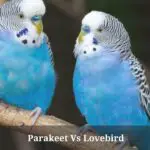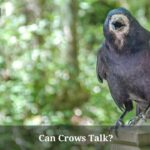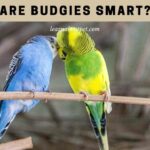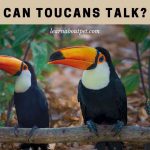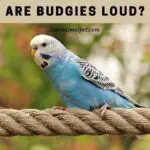One question that people tend to pose about Lovebirds is as to whether the Lovebirds can talk. After all, Lovebirds are categorized as parrots, and all parrots are supposed to be talkers. Let’s find out whether indeed Lovebirds can talk.
Do Lovebirds talk? Yes, some Lovebirds have the ability to mimic simple words and even some simple phrases. Their ability to grasp and remember words may not exactly be excellent, and neither is their voice very clear. But some do have the ability to talk a bit.
In comparison to certain other types of parrots, it is hard to describe Lovebirds as the best talkers. They do have their other attractions, but talking is usually not their strongest selling point.
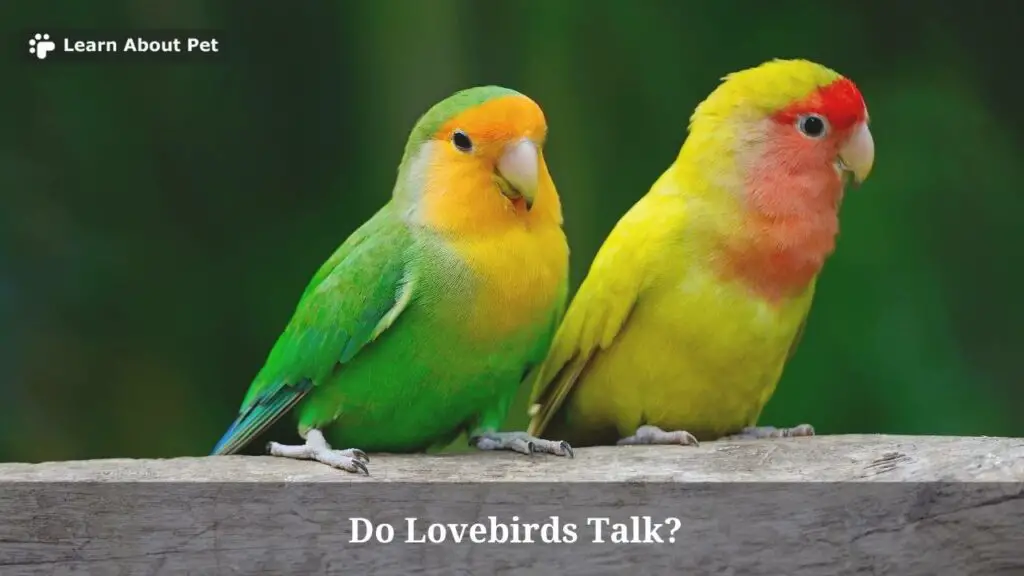
Nonetheless, if you have a Lovebird – especially a very young one – you can attempt teaching it to talk. This is supposing you have the time, tenacity and patience necessary for the endeavor.
Some Lovebirds do learn to talk.
Do Birds Really Talk?
Before going any further with a discussion on talking Lovebirds, it is important to first establish whether birds can really talk.
For many people who have never come across talking birds, the whole idea is always so unbelievable. And that is what always leads to the question on whether birds can really talk.
So, do birds really talk? The answer is yes: some birds can really talk. They talk by way of mimicking words and sometimes even phrases they hear their human companions using.
When birds talk, they don’t really understand what they are saying. It is more of mimicking sounds. But some birds do it so well that it sounds like passable speech.
Do Lovebirds Talk?
Often, people who are considering adopting Lovebirds as pets express interest in knowing whether the Lovebirds can talk.
There are also those who already have Lovebirds they are keeping as pets. Now they desire to do more exciting things with them. And they start wondering whether the Lovebirds can talk.
So, specifically with regard to Lovebirds do they talk? Will Lovebirds talk under any circumstances?
The answer is ‘yes’, some Lovebirds can and do indeed talk. They learn to mimic human words, phrases and even whistle tunes. And they start ‘talking’ by repeating the same.
The ‘Lovebirds’ in question here are specifically the parrots that are collectively referred to as ‘African Lovebirds’. Thus what we are answering is, in other words, the do African Lovebirds talk question…
One may then go further and ask, do Lovebird parrots talk as well as other types of parrots? Can Lovebirds say words as clearly as, say, Budgies? In other words, are Lovebirds good at talking?
And that is where it gets a bit disappointing. This is because although Lovebirds have some ability to talk, it is not as good as what we find in some other parrots.
Lovebirds seem to be a bit clumsier, when it comes to mastering words. And their vocalization is not always very clear, mostly due to their high pitch voices.
But in theory, they do talk. At least some of them do.
Do Fischer Lovebirds Talk?
With good training, some Fischer Lovebirds may come to learn how to mimic some human words.
The speech of Fischer Lovebirds, as indeed all other Lovebirds, is not always clear. What makes it difficult to understand is the high pitch of their voices.
The extent to which they are able to master words also has limits.
But yes, some Fischer Lovebirds are capable of learning how to talk.
By the way, some people refer to these Fischer Lovebirds as ‘fisheries Lovebirds’. Thus for anyone with the do fisheries Lovebirds talk question, the answer is along the lines we have explained above.
Do Peach Faced Lovebirds Talk?
It is not really common to find peach faced Lovebirds that are good at talking.
People who keep tabs on these matters tell us that the likelihood of finding a talking peach faced Lovebird is like 0.01%. So it is rather rare.
What they lack in terms of talking ability, they make up for it in terms of whistling ability.
Do Black Mask Lovebirds Talk?
Even when they manage to learn how to talk, it can be difficult to make sense of Black Mask Lovebirds’ ‘speech’.
This is because their voice is not only too high pitched, but also somewhat squeaky.
It doesn’t help that their minds always seem to be preoccupied with other things.
Thus mastering words is often too big a challenge to them: not for want of intelligence, but because they seem to have other ‘better’ things to occupy their minds with.
By the way, this is largely also what applies with regard to the Blue Masked Lovebird. Thus if you were wondering, do blue Lovebirds talk, the answer is along those lines.
So what we have said is the general answer to the question on, do masked Lovebirds talk? As we saw, their ability to master words is usually wanting.
And even when they manage to master words, their high pitch squeaky voices obscure their speech.
Do Male Or Female Lovebirds Talk More?
When it comes to the ability to talk in parrots, there tends to be a gender dimension. So we normally find the males talking better than the females.
Does this apply to Lovebirds too? Do male Lovebirds talk better? Or do female Lovebirds talk better? In fact, can female Lovebirds talk at all?
The truth of the matter is that male Lovebirds are only slightly better than female Lovebirds at talking.
In fact, there are those who argue that with equal training, the female Lovebirds seem to talk more or less as well as the males.
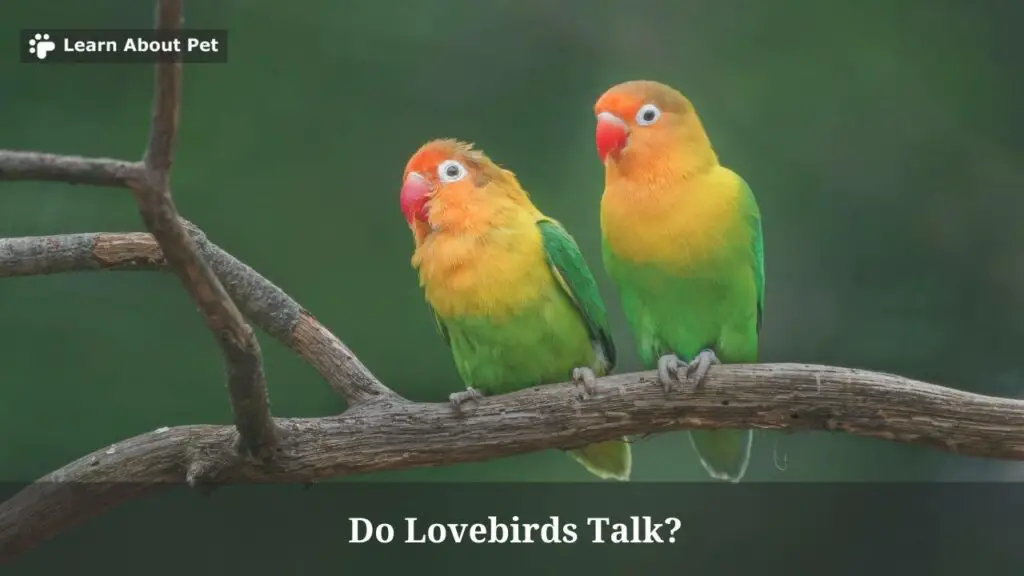
How Do Lovebirds Talk?
In Lovebirds, there is an organ known as the syrinx. This is somewhere within their trachea, specifically on the trachea’s caudal side. It is through vibrations of this syrinx that Lovebirds manage to talk.
When a Lovebird hears a word, phrase of whistling tune, it may like it. Then it endeavors to memorize it. Once it memorizes it, it repeats it – as well as it can remember: thus ‘talking’ in that sense.
Can Lovebirds talk in English? Yes, if your Lovebird is one of those that are inclined to mimic human words, it may be able to mimic and eventually master some English words.
For instance, if your Lovebird has an English name, it can even learn how to say it.
Can You Teach Lovebirds To Talk?
After establishing that Lovebirds may have some ability to talk, many people endeavor to take the whole thing to another level.
They endeavor to know whether they can teach their Lovebirds to talk. Do Lovebirds talk, if they are trained to do so?
The answer is yes, you can teach some Lovebirds to talk. There are people who have managed to teach Lovebirds to talk. So it is doable. But not all Lovebirds may like to learn how to talk.
How Do You Teach A Lovebird To Talk?
So far, we have established that it is possible for some Lovebirds to talk. We have also established you can teach a Lovebird to talk.
Given those facts, you often find someone asking, how do I make my Lovebird talk?
So, indeed, how do you teach Lovebirds to talk?
At its simplest level, teaching Lovebirds to talk entails three things.
Firstly, you identify the words you wish to teach the Lovebird. These should be simple words.
Secondly, you repeat the words until the Lovebird masters them.
Thirdly, when the Lovebird masters them and manages to repeat them after you, you reward it with a treat. This is for purposes of getting positive reinforcement.
Other questions may arise, with regard to the whole training.
One may for instance want to know, do Lovebirds like to be held while being taught to talk? And the answer is ‘yes’ – holding them may improve mastery and retention somehow.
But that may work better if the birds were previously arm trained. Otherwise holding birds may increase their anxiety levels, consequently lowering mastery and retention levels.
When Do Lovebirds Start To Talk?
Another common question is on when do Lovebirds start to talk normally? The answer to the when do Lovebirds start talking question depends on the point at which their training is initiated.
To get the best results, you need to start training your Lovebird to talk while the bird is very young. Thus you initiate training when the Lovebird is still a few weeks old.
Then you need to be consistent in the training, until the bird masters some words and/or phrases.
You must not, however, be too stubborn in your attempt to teach the Lovebird to speak. If it is clearly unwilling or unable to learn, you need to know when to just leave it alone.
As said earlier, not all Lovebirds can learn to talk. And even for those that can talk, the degrees to which they are able to do so varies.
Final Verdict – Do Lovebirds Talk
Some Lovebirds are able to talk. They just listen to some human words carefully, master them, then mimic them. The output comes out through a vocal organ known as the syrinx, in the Lovebird’s trachea.
In comparison to other birds, Lovebirds are not exactly excellent talkers. They don’t really master words as well. And the few they master, they don’t pronounce them well, due to the higher than normal voice pitches they have.
Teaching a Lovebird to speak requires tenacity, patience and a bit of time. Focus should be on getting the Lovebird to master those few words, the mimic them.
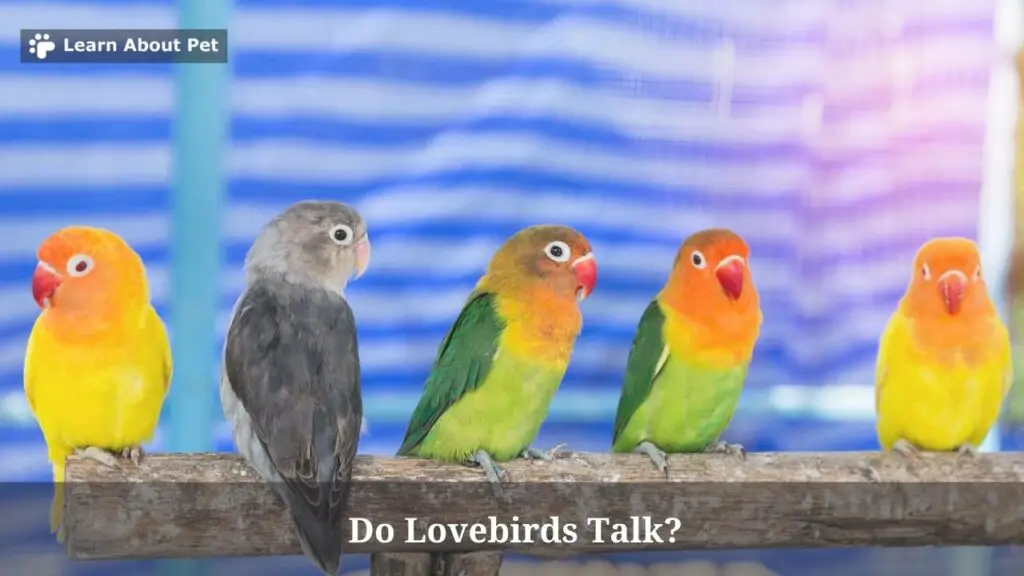
Positive reinforcement may help improve the Lovebird’s mastery, retention and mimicking.
If the Lovebird you are trying to teach how to talk doesn’t get it at all, you may be better off just leaving it alone. As noted earlier, not all Lovebirds have the ability to talk.
A Lovebird that is unable to talk may nonetheless surprise you with its whistling ability or other qualities.
Thus even if you have one of those Lovebirds that simply can’t talk, there are still lots of fun things you can do with it.
As a pet lover, make sure to learn about pet more and give your pet lovebird a good and comfortable life!

Welcome to Learn About Pet. My name is Rajkumar Ravichandran and I love all pets, travel, and amazing food. I write about my passion and personal experience caring for multiple pets in this blog! ❤️
Post Disclaimer
DISCLAIMER: THIS BLOG OR WEBSITE, "Learn About Pet", DOES NOT PROVIDE YOU WITH MEDICAL ADVICE AND IS NOT A SUBSTITUTE FOR MEDICAL ADVICE. ALWAYS GET IN TOUCH WITH YOUR PERSONAL VETERINARIAN AND USE INFORMATION HERE AS GENERAL ADVICE.
The information, including but not limited to, text, graphics, images and other material contained on this website are for informational purposes only. No material on this site is intended to be a substitute for professional veterinary advice, food recommendation, diagnosis, or treatment. Always seek the advice of your veterinarian or other qualified health care provider with any questions you may have regarding a medical condition or for pet food related questions.
